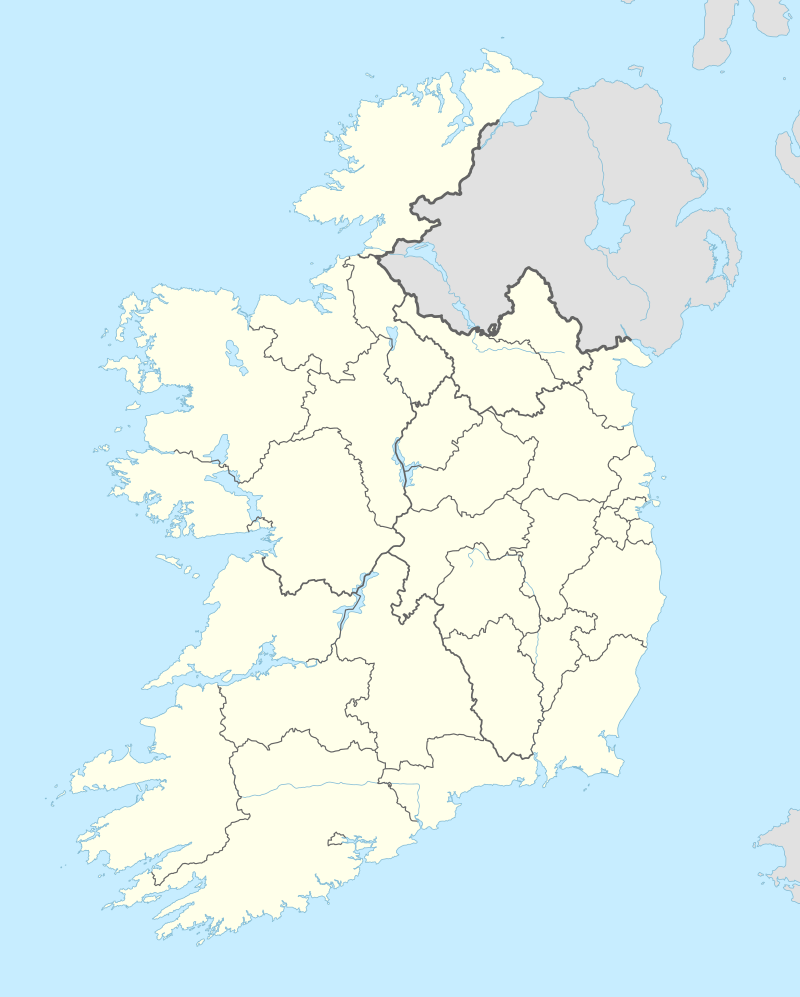Drumlohan Souterrain and Ogham Stones
Drumlohan souterrain and ogham stones, known locally as the Ogham Cave, is a souterrain with ogham stones forming a National Monument located in County Waterford, Ireland.[1][2][3]
| Drumlohan souterrain and ogham stones | |
|---|---|
| Native name Irish: Uaimh agus Clochanna Oghaim Dhrom Lócháin | |
| The Ogham Cave | |
 Location of Drumlohan souterrain and ogham stones in Ireland | |
| Type | Souterrain and ogham stones |
| Location | Drumlohan, Stradbally, County Waterford, Ireland |
| Coordinates | 52.162846°N 7.464882°W |
| Elevation | 84 m (276 ft) |
| Built | AD 400–700 (ogham stones) AD 800–900 (souterrain) |
| Owner | private |
National Monument of Ireland | |
| Official name: Drumlohan Souterrain and Ogham Stones | |
| Reference no. | 154 |
Location
Drumlohan souterrain and ogham stones are located in farmland 4 km (2½ mi) east of Lemybrien.[4]
History
The ogham stones were carved between 400 and 700 AD.[5]
The souterrain is believed to have been constructed around the 9th century AD and is aligned WSW, facing the setting sun. Souterrains were storage sites and places of refuge.[6][7]
In July/August 1867 a local farmer rediscovered the souterrain and ogham stones. In 1936 part of the souterrain was dismantled and some of the ogham stones re-erected above ground.[8]
Description
Souterrain
This souterrain gallery is about 4.9 m (16 ft) long and 1.3 m (4 ft) wide, with a roof height of up to 1.2 m (4 ft).[9] It is constructed of orthostats roofed with lintels, and ten ogham stones were used as lintels and sidestones (some of them being installed upside-down).[10] One of the roofstones bears cup marks.[11]
Ogham stones
The stones (CIIC 272–281) vary in size. All are greenschist, except for two of slate and one of conglomerate. The inscriptions are:
- MANU MAGUNO GATI MOCOI MACORBO (of Manu the boy of Gáeth, of the tribe of Macorbo)[12] — perhaps the Dál Maic-Cuirp, one of the Déisi Muman
- CALUNOVIC[A] MAQI MUCOI LIT[EN]Ị (of Culann, son of the tribe of Litenos)[13]
- MAQI-INI ̣ ̣ ? ̣ ̣ MAQI(?) QE(?)]TTEAS (of Maqinni, son of Qetteas)
- CUNALEGEA MAQI C[ ... ]SALAR CELI AVI QVECI (of Conlaoi son of C ... salar, follower of the grandson of Cuach)
- BIGU MAQI LAG ... (of Bigu, son of Lag ... )
- BIR MAQI MUCOI ROTTAIS (of Bir, son of the tribe of Rottis) — referring to the Rothrige, a subject tribe of the Déisí
- [ ... ] MAQI NE[TACUN]AS ( ... son of Netacunas). The name Netacunas means "Hound's champion."
- DENAVEC[A MU]COI MEDALO (of Denaveca of the tribe of Medalo) — maybe the Dál Mo Dala
- BRO[INION]AS (of Broinionas)
- DEAGOS MAQI MUCO[I ... NAI (of Deagos, son of the tribe of I ... nai)[14][15]
References
- "Proceedings of the Royal Irish Academy". Royal Irish Academy. 1 January 1874 – via Google Books.
- Ferguson, Sir Samuel (1 January 1887). Ogham Inscriptions in Ireland, Wales, and Scotland. D. Douglas – via Internet Archive.
drumlohan.
- Clinton, Mark (1 January 2001). "The Souterrains of Ireland". Wordwell – via Google Books.
- Hannon, Ed (2016-10-03). "Drumlohan Ogham Stones & Souterrain, Waterford, Ireland | Visions Of The Past". Visionsofthepastblog.com. Retrieved 2017-05-23.
- "Drumlohan Ogham Stones/Megalithic Monuments Of Ireland.Com". Megalithicmonumentsofireland.com. Retrieved 2017-05-23.
- "Drumlohan". Prehistoric Waterford. 2017-03-23. Retrieved 2017-05-23.
- "Prehistoric and Early Ireland @ megalithomania.com - Drumlohan Ogham Stone, County Waterford". Megalithomania.com. Retrieved 2017-05-23.
- "Drumlohan Ogham Stones". Megalithicireland.com. Retrieved 2017-05-23.
- "Drumlohan". Irishstones.org. 2016-06-08. Retrieved 2017-05-23.
- "Drumlohan". Irishantiquities.bravehost.com. Retrieved 2017-05-23.
- "Old Waterford Society : Decies" (PDF). Snap.waterfordcoco.ie. 1987. Retrieved 2017-05-23.
- Power, Patrick C. (1 January 1990). "History of Waterford: City and County". Mercier Press – via Google Books.
- Thomas, Charles (1 January 1994). "And Shall These Mute Stones Speak?: Post-Roman Inscriptions in Western Britain". University of Wales Press – via Google Books.
- Halpin, Andy; Newman, Conor (26 October 2006). "Ireland: An Oxford Archaeological Guide to Sites from Earliest Times to AD 1600". OUP Oxford – via Google Books.
- "Ogham in 3D - Drumlohan / 272. Drumlohan I". Ogham.celt.dias.ie. 2017-05-12. Retrieved 2017-05-23.